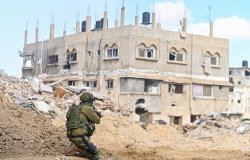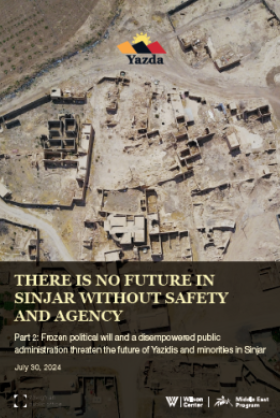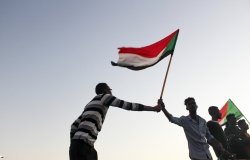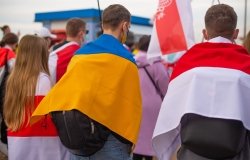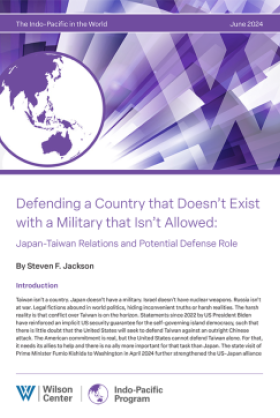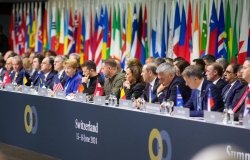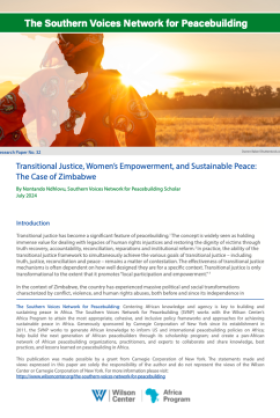Voices from Palestine: Women Leaders Speak on Peace and Security
Cairo Arafat, Government Media Center, Prime Minister's Office; Naila Ayesh, Director, Women's Affairs Training and Research Center; Amal Hadweh, former Program Manager, UN Refugee and Works Agency, West Bank; Enas H. H. Nazal, Financial Planning Department Manager, Strategic Planning Department, Ministry of the Interior, Palestinian National Authority; Moderator: Carla Koppell, Director, The Institute for Inclusive Security
Overview
A group of Palestinian women leaders discussed the challenges they face as women and as Palestinians, as well as progress they have made in their respective fields.
On April 7, the Middle East Program and The Institute for Inclusive Security hosted an event on "Voices from Palestine: Women Leaders Speak on Peace and Security" with Cairo Arafat, Government Media Center, Prime Minister's Office; Naila Ayesh, Director, Women's Affairs Training and Research Center; Amal Hadweh, Former Program Manager, UN Refugee and Works Agency, West Bank; Enas H. H. Nazal, Financial Planning Department Manager, Strategic Planning Department, Ministry of the Interior, Palestinian National Authority. Carla Koppell, Director of The Institute for Inclusive Security, moderated the event.
Koppell opened the panel by commenting on the unique breadth and depth of knowledge offered by the combined experiences of the panelists. She pointed out that their knowledge of the subject matter comes from their personal and professional experiences in Gaza, the West Bank, and Jerusalem, among other places.
Arafat commented that the issue of women's rights only arises when there is relative peace. She reasoned that if women's issues are sidelined, they cannot be effectively dealt with when they are most critical, nor can women play an active role in fostering peace for Palestinians. She attributed this problem to the fact that the Israeli-Palestinian conflict overshadows many other pertinent issues. She identified challenges like staying positive to encourage the inclusion of new ideas and voices within the peace process, as well as overcoming biases that stereotype Palestinians and women as weak. Arafat observed that while women are present in the peace process, they are not present as leaders. She noted that the Palestinian government is supportive of women's inclusion and participation in government and that Palestinian women are making strides in higher education and employment.
Hadweh addressed how Palestinian women develop skills and draw strength from being the main source of support for their families and in their homes. She stressed the need for political and economic empowerment for women so that they are able to continue tending to the needs of the home, as well as helping to alleviate the stress of potentially unemployed males in the household, thereby reducing domestic violence. Hadweh noted that a strong woman creates an environment for strong children.
Ayesh commented that as mothers, Palestinian women are against violence in all its forms, regardless of their source or target. She mentioned that there is growing fear among women of an escalation in violence in Gaza because the victims are often children. She echoed Hadweh in her claim that domestic violence is a result of the stress experienced by unemployed males and the ongoing occupation. Ayesh stated that economic and political training workshops for women have been made available, the benefits of which extend to the entire family when the skills to start a small business are attained.
Nazal stressed that she is proud to be a Palestinian and a woman in the fields of government financial planning and in the security sector because her position defies stereotypes about Palestinian women; only 2 percent of those in the security sector are women, she said. Nazal observed that women tend to reflect transparency and peaceful intentions because of their natural inclination toward positive action.
By Sara Girgis, Middle East Program
Speakers
Cairo Arafat
Naila Ayesh
Amal Hadweh
Enas Nazal
Carla Koppell
Hosted By

Middle East Program
The Wilson Center’s Middle East Program serves as a crucial resource for the policymaking community and beyond, providing analyses and research that helps inform US foreign policymaking, stimulates public debate, and expands knowledge about issues in the wider Middle East and North Africa (MENA) region. Read more
Thank you for your interest in this event. Please send any feedback or questions to our Events staff.
